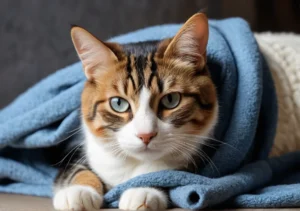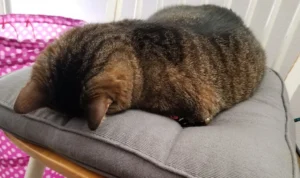Cats are fascinating creatures with many quirky behaviors that keep us guessing. One such behavior that often leaves owners curious is why cats claw before lying down. It’s a common sight to see a cat knead and scratch at a cushion or bed before settling in for a nap. But why do they do this? Let’s explore the reasons behind this fascinating feline behavior.
The Comfort Factor
When your feline friend starts clawing at a surface before settling down for a nap, it’s not just a random behavior. Cats claw and knead as a way to create a comfortable sleeping spot for themselves. This instinct harks back to their kittenhood when they would knead their mother’s belly to stimulate milk flow. So, when your cat is clawing before lying down, it’s likely seeking comfort and a sense of security.
While this behavior may sometimes be directed towards your lap or a cozy blanket, it’s not uncommon to see cats clawing at furniture or bedding. This repetitive motion helps them soften the surface, making it more plush and suitable for relaxation. So, next time you see your cat engaging in this behavior, understand that it’s simply trying to make its sleeping spot as cozy as possible.
Territorial Instincts
Apart from the comfort aspect, clawing before lying down also serves a territorial purpose for cats. By scratching and kneading at different surfaces, cats release scent from glands in their paws, marking their territory. This behavior is akin to leaving a calling card that says, “This spot is mine,” which can help them feel more secure in their surroundings.
In addition to scent marking, clawing can also serve as a way for cats to stretch and exercise their muscles, promoting flexibility and overall wellness. Providing appropriate scratching posts and surfaces can help redirect this behavior in a positive way, ensuring your cat can fulfill its natural instincts without damaging your furniture.
Remember, understanding why cats claw before lying down can help you create a nurturing environment for your furry friend while respecting its innate behaviors. By acknowledging their need for comfort and territory, you can enhance their well-being and strengthen the bond you share.
Relieving Stress
Cats often claw before lying down as a way to relieve stress and tension. This rhythmic motion mimics the kneading behavior they exhibited as kittens when nursing from their mother. The act of clawing and kneading helps cats release built-up stress and soothe themselves, promoting relaxation and comfort. So, the next time your feline friend starts clawing before settling down, remember that it’s their natural way of unwinding and destressing after a long day.
Stretching and Strengthening
Scratching and kneading aren’t just random behaviors – they serve a practical purpose for your cat’s physical health. When cats claw at surfaces, they are stretching their muscles and keeping their claws strong and healthy. This action also helps them maintain proper paw functioning and flexibility. By engaging in these activities regularly, cats can prevent muscle tightness and maintain their claws in optimal condition. To support your cat’s stretching and strengthening needs, consider providing a scratching post or pad to encourage these beneficial behaviors.
Additional Unique Insight:
In addition to stretching muscles and sharpening claws, scratching and kneading can help cats mark their territory with scent glands located in their paw pads. This marking behavior serves as a way for cats to communicate their presence and claim ownership of their space. By allowing your cat to engage in these natural behaviors, you’re not only promoting their physical health but also helping them establish a sense of security and comfort in their environment.
Instinctual Behaviors
Cats possess unique instinctual behaviors inherited from their wild ancestors, which often manifest in actions like scratching and kneading. When a cat claws before lying down, it’s instinctively preparing its sleeping area to make it comfortable and safe. In the wild, cats would scratch the ground or a tree to create a cozy spot to rest. This behavior also serves as a way for them to mark their territory with scent glands in their paws, leaving behind their signature scent as a form of communication with other animals.
Providing Mental Stimulation
Engaging in scratching and kneading activities isn’t just about physical comfort for cats. It also provides mental stimulation, keeping their minds sharp and engaged. By incorporating these natural behaviors into their daily routine, cats can relieve stress, maintain healthy muscles, and satisfy their innate instincts. Additionally, kneading – the rhythmic motion of pushing their paws in and out – can be soothing for cats, reminiscent of the nursing behavior they exhibited as kittens. This activity can help them relax and feel secure, contributing to their overall well-being.
Benefits of scratching and kneading for mental stimulation: 1. Mental Exercise: Encourages cats to problem-solve and engage their brains. 2. Stress Relief: Helps cats relax and reduce anxiety. 3. Physical Health: Promotes healthy muscles and claws. 4. Comfort: Mimics comforting behaviors from kittenhood, aiding relaxation. 5. Territory Marking: Allows cats to establish their presence and ownership.
Remember, allowing your cat to exhibit these natural behaviors enriches their lives and strengthens the human-animal bond. By understanding why they claw before lying down, you can better appreciate and nurture your feline friend’s instincts and well-being.
Encouraging Restful Sleep
Cats claw before lying down because it’s a natural behavior that helps them get into a restful state. When they knead and claw at a soft surface, it mimics the motion of kneading their mother’s belly as kittens, which brings them comfort and relaxation. This soothing action releases endorphins, making them feel calm and content, ultimately leading to a better quality of sleep. So, next time you see your fluffy feline preparing their sleeping spot with a little scratch and knead, know that they’re just getting ready for some sweet dreams.
Encouraging Positive Behavior
Providing appropriate outlets for scratching and kneading not only prevents destructive behavior in cats but also promotes a harmonious living environment. Investing in a sturdy scratching post or pad can redirect your cat’s natural urge to scratch onto acceptable surfaces, saving your furniture and keeping your kitty happy. Remember, cats need to scratch to stretch their muscles and maintain healthy claws. By offering them suitable alternatives and positively reinforcing good behavior, you’re not just saving your belongings but also fostering a positive and enriching bond with your feline friend.
Additional Unique Insight:
Did you know that a cat’s paw pads contain scent glands? When they knead, they release pheromones, marking their territory with familiar scents. This behavior helps them feel secure and relaxed in their environment, making it a crucial aspect of their overall well-being. So, when your cat is clawing before lying down, they’re not just prepping for a nap but also making their space feel like home.
Remember, understanding your cat’s natural instincts and providing them with the right resources is key to a happy and harmonious coexistence. By encouraging their natural behaviors like clawing before lying down, you’re not just promoting their well-being but also strengthening your bond with your feline companion.
Fun Facts About Cat Behavior
Do you ever wonder why your furry feline friend has the strange habit of clawing before settling down for a nap? Well, it turns out that this behavior is actually a throwback to their wild ancestors. In the wild, cats would claw at their surroundings to create a comfortable sleeping spot or to mark their territory. So, when your cat claws at their bed or your couch before lying down, they are simply following their instincts.
Here are some interesting facts about cat behavior:
- Cats have scent glands in their paws, so when they scratch, they are not only marking their territory but also leaving their scent behind.
- Kneading, another common behavior in cats, is thought to be a leftover instinct from kittenhood when they would knead their mother’s belly to stimulate milk flow.
- Cats often groom themselves after eating as a way to clean up and remove any lingering food smells that could attract predators.
- Chattering or chirping noises that cats make when they see birds or squirrels is a sign of frustration at not being able to catch their prey.
- Contrary to popular belief, cats are not actually nocturnal but crepuscular, meaning they are most active during dawn and dusk.
Next time you see your cat clawing before lying down, remember that it’s just their way of feeling secure and comfortable in their environment. They may be domesticated now, but at heart, they still carry a little piece of the wild within them.
Alex, a passionate animal lover, has experience in training and understanding animal behavior. As a proud pet parent to two dogs and three cats, he founded AnimalReport.net to share insights from animal experts and expand his knowledge of the animal kingdom.




